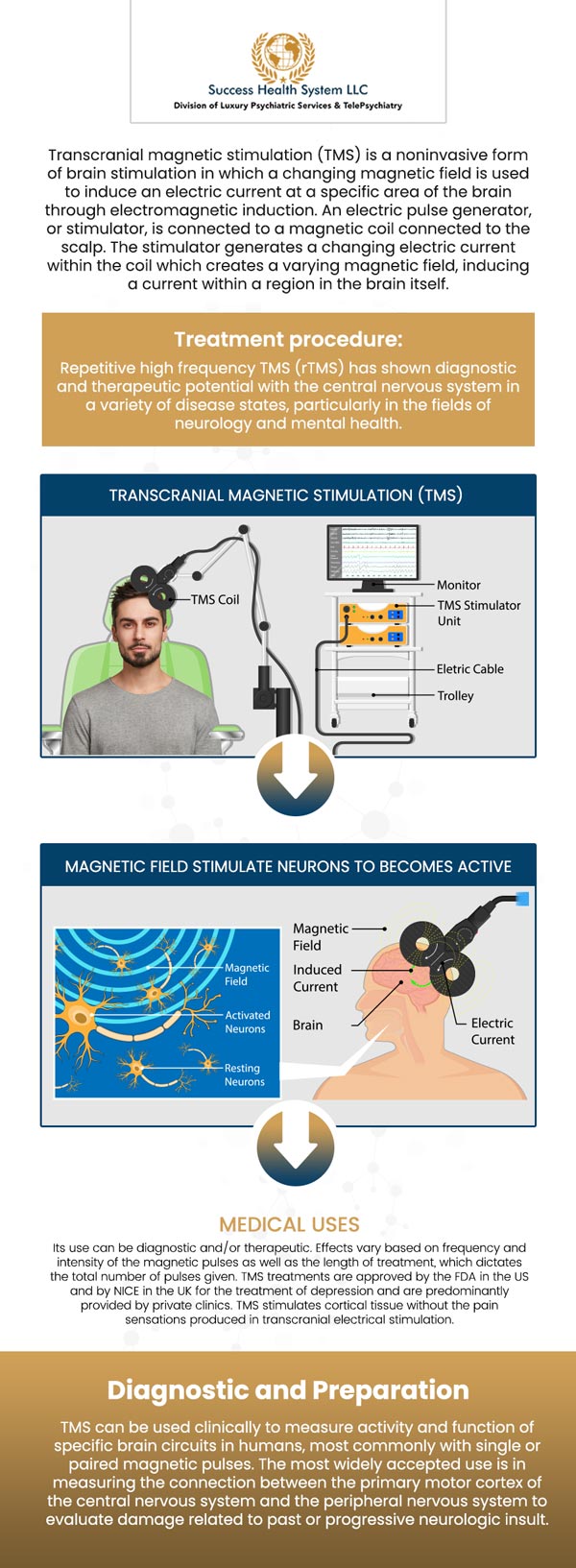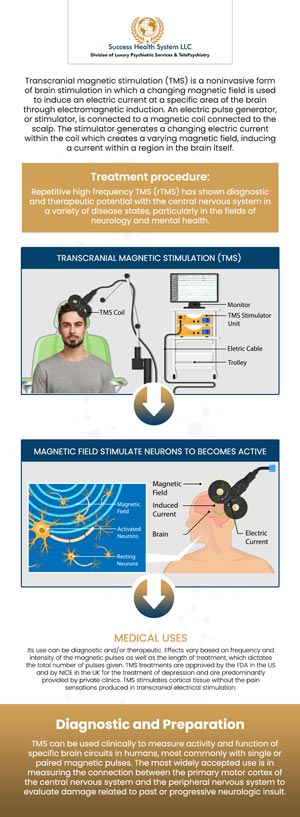TMS Therapy Specialist in Creve Coeur, MO
Transcranial Magnetic Stimulation (TMS) therapy is clinically approved and effectively used to treat a range of mental health conditions, with Major Depressive Disorder (MDD) being the most prominent. Dr. Moses Tabe Ambilichu, M.D., a board-certified psychiatrist, recommends TMS, particularly for individuals who have not responded well to traditional depression treatments, such as psychotherapy and antidepressants. For more details, contact us or request an appointment online today. We are conveniently located at 12401 Olive Boulevard, Suite 206, Creve Coeur MO, 63141.
COMING SOON




Table of Contents:
Does TMS therapy really work?
How many TMS treatment sessions do you need?
How long do the effects of TMS last?
What conditions can be treated by TMS therapy?
Is TMS therapy safe?
Where to get TMS therapy near me in Creve Coeur MO?
TMS therapy has garnered attention for its effectiveness in treating specific mental health conditions, specifically major depressive disorder (MDD), with more recent studies showing its effectiveness with obsessive-compulsive disorder (OCD). Clinical studies combined with patient reporting show compelling evidence for the effectiveness of TMS, particularly for those patients who have not found success with prior treatment methods, often medication or psychotherapy, with a success rate between 70 and 80 percent. While the response to the treatment is certainly not the same for everyone, patients report a significant number of symptoms to be treated or less intense, with some patients even being able to achieve full remission from depression.
The optimal number of TMS therapy sessions for a given person will vary, and this is attributed to the different individual circumstances, the severity of the condition, and the patient’s initial response to treatment. With this in mind, there is a general range of treatment sessions that have shown to provide substantial results. Approximately 30 treatment sessions over six weeks and up to 40 sessions over eight weeks are to be expected for those considering TMS therapy. Many patients will begin to notice improvements in their symptoms after a few sessions, whereas, others may need additional treatments beyond the initial course to achieve the best results. Finally, some patients may be recommended maintenance sessions to sustain the benefits of the therapy over an even longer period, especially for those concerned about persistent depressive episodes.
It may not come as a surprise that the duration of the effects of TMS therapy can vary significantly as duration is influenced by the severity of a patient’s condition and the overall response to therapy. For many, the benefits of TMS–largely improved mood, increased energy levels, and enhanced cognitive function– generally last anywhere from six months to over a year following the treatment course. Some patients may also seek periodic maintenance sessions to prolong the benefits, thereby lengthening the duration of TMS therapy. Furthermore, factors such as lifestyle, ongoing mental health care, and stress management play a critical role in the development of the long-lasting benefits of TMS. For those who struggle with these aspects, speak with your trusted medical professional to develop a plan to ensure TMS treatment not only goes well but helps aid the ongoing process that is mental wellbeing.
TMS, or Transcranial Magnetic Stimulation therapy has been clinically approved and successfully used to treat a range of mental health conditions with the most notable being Major Depressive Mood Disorder, otherwise known as MDD. It is specifically recommended for those who have not responded well to traditional types of depression treatments, namely antidepressants and psychotherapy. Beyond forms of depression, recent studies and results show that those who suffer from anxiety disorders or OCD can often benefit from TMS therapy, offering a new way to seek relief from the detrimental effects that come with such conditions.
TMS therapy is widely regarded to be safe and well-tolerated as a treatment option for several mental health conditions. It’s non-invasive, meaning that it does not require any intrusive cuts about the body and it does not require anesthesia or sedation. Some may experience mild, temporary side effects, with the most common being headaches and lightheadedness. Compared to treatments like medication, TMS does not possess systemic side effects, making it a favorable option for those who may be sensitive to or wish to avoid medication-related adverse effects. For those still uncertain, it may help to hear that rigorous clinical trials and research back the safety of TMS, with the FDA approving it for the treatment of depression and related mental health conditions. However, it is still important for patients to consult with their healthcare professional to determine if TMS is suitable for their own specific needs.
At our clinic located at 12401 Olive Boulevard, Suite 206, Creve Coeur MO, 63141, we are excited to assist and are bent on providing the best care possible for those experiencing difficulties with their mental health. If you believe TMS may be a suitable treatment option for a loved one or yourself, do not hesitate to reach out. For more details, contact us or request an appointment online today. We serve patients from Creve Coeur MO, Overland MO, Bridgeton MO, Clayton MO, Kirkwood MO, Chesterfield MO, Clarkson Valley MO and surrounding areas.

Check Out Our 5 Star Reviews


Additional Services You May Be Interested In
▸Addiction Treatment
▸ADHD Treatment
▸Anxiety Treatment
▸Bipolar Disorder
▸Depressive Disorders
▸Mental Disorder
▸Obsessive Compulsive Disorders
▸Psychotic Disorders
▸PTSD Treatment
▸Phobias and Fears Therapist
▸Psychiatrist
▸Substance Disorder
▸Social Anxiety Psychiatrist
▸Medication Management
▸Psychotherapy
▸Exomind TMS – Columbia
▸Spravato – Independence

Additional Services You May Be Interested In
▸Addiction Treatment
▸ADHD Treatment
▸Anxiety Treatment
▸Bipolar Disorder
▸Depressive Disorders
▸Mental Disorder
▸Obsessive Compulsive Disorders
▸Psychotic Disorders
▸PTSD Treatment
▸Phobias and Fears Therapist
▸Psychiatrist
▸Substance Disorder
▸Social Anxiety Psychiatrist
▸Medication Management
▸Psychotherapy
▸Exomind TMS – Columbia
▸Spravato – Independence





